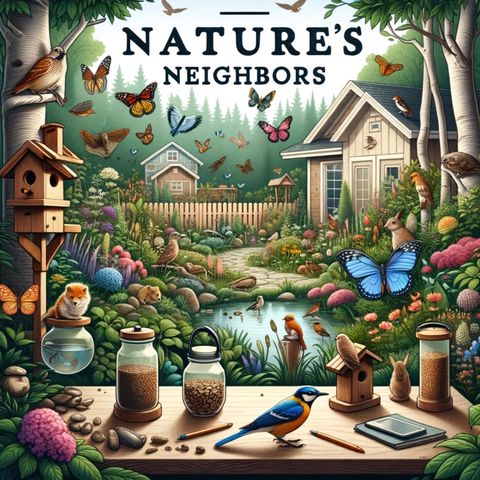"Nature's Neighbors: Caring for Birds and Wildlife in Your Allotment Garden" | Gardening Tips & Allotment Advice Podcast

Descarga y escucha en cualquier lugar
Descarga tus episodios favoritos y disfrútalos, ¡dondequiera que estés! Regístrate o inicia sesión ahora para acceder a la escucha sin conexión.
"Nature's Neighbors: Caring for Birds and Wildlife in Your Allotment Garden" | Gardening Tips & Allotment Advice Podcast
Esta transcripción es generada automáticamente. Ten en cuenta que no se garantiza una precisión absoluta.
Descripción
Welcome to "Nature's Neighbors: Caring for Birds and Wildlife in Your Allotment Garden," your ultimate guide to creating a thriving habitat for birds and other wildlife in your garden. In...
mostra másThe Importance of Wildlife in Your Garden
Encouraging birds and other wildlife in your garden has numerous benefits. Not only do these creatures add beauty and interest, but they also play crucial roles in maintaining a healthy ecosystem. Birds, for example, help control insect populations, pollinate plants, and disperse seeds. In this episode, we’ll discuss the ecological importance of fostering wildlife and how doing so can improve the overall health of your garden.
Creating a Wildlife-Friendly Habitat
To attract and support wildlife, your garden needs to provide food, water, shelter, and nesting sites. Here are some essential tips:
**1. Planting for Wildlife:** Choose a variety of native plants that produce seeds, berries, and nectar. These plants will provide food throughout the year. Consider incorporating a mix of trees, shrubs, and flowers to cater to different species' needs.
**2. Providing Water Sources:** A reliable water source is essential for wildlife. Install bird baths, small ponds, or water dishes to provide drinking and bathing water for birds and other creatures. Ensure these water sources are kept clean and replenished regularly.
**3. Creating Shelter and Nesting Sites:** Birds and small mammals need safe places to hide from predators and harsh weather. Plant dense shrubs, build brush piles, and leave some areas of your garden undisturbed. Install birdhouses and nesting boxes to offer secure nesting sites.
**4. Avoiding Chemicals:** Pesticides and herbicides can harm wildlife. Opt for organic gardening methods and use natural pest control techniques to keep your garden healthy without endangering the creatures that live there.
Supporting Specific Wildlife Species
Different species have unique needs. Here’s how to support some common garden visitors:
**1. Birds:** Install feeders with a variety of seeds to attract different bird species. Offer suet in winter for high-energy food. Provide nesting materials such as twigs, leaves, and grass clippings.
**2. Pollinators:** Plant a variety of flowering plants to provide nectar for bees, butterflies, and other pollinators. Avoid using pesticides, as they can be harmful to these essential creatures.
**3. Small Mammals:** Leave some areas of your garden wild to provide habitat for hedgehogs, squirrels, and other small mammals. Provide food sources such as nuts, fruits, and berries.
Listener Questions and Success Stories
We love engaging with our listeners! In this episode, we’ll feature your questions about creating a wildlife-friendly garden and share success stories from fellow gardeners who have successfully attracted and supported wildlife in their allotments. Learn from their experiences and get practical advice tailored to your gardening challenges.
Conclusion
"Nature's Neighbors: Caring for Birds and Wildlife in Your Allotment Garden" is your comprehensive guide to enhancing biodiversity and creating a harmonious environment in your garden. With expert tips, practical advice, and inspiring stories, this episode will help you transform your allotment into a haven for wildlife. Tune in, subscribe, and join us as we explore the joys of gardening with nature’s neighbors. Happy gardening!
Información
Copyright 2024 - Spreaker Inc. an iHeartMedia Company
